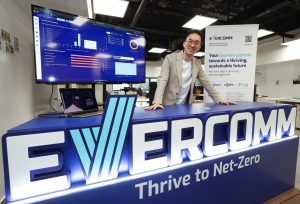In the race to decarbonize Asia’s industrial heartlands, big promises are easy. Turning those promises into bankable, shovel-ready projects? That’s where most ambitions stall. “After more than a decade in the trenches of transition finance, one lesson stands above the rest: climate ambition only becomes investable infrastructure when two forces converge – an engineering-backed transition strategy and innovative financing solutions,” explains Ted Chen, who is the CEO of Evercomm.
Evercomm lives at that intersection, bridging the chasm between vision and execution. It transforms scattered decarbonization opportunities into standardized portfolios that lenders can underwrite with confidence, and that policymakers can scale for impact.

Photo: Ted Chen, CEO of Evercomm
From Pledges to Bankable Pipelines
The problem isn’t a lack of capital, it’s a lack of confidence grounded in verifiable data. Evercomm begins where climate targets meet industrial reality, translating site-level opportunities – heat recovery, process optimization, electrification – into lender-grade project simulation. Each simulation captures the full picture: capex, opex, abatement potential, payback. Then, those results are mapped against transition-risk matrices familiar to capital providers.
For governments and financial institutions, it’s a triple win: less risk, faster greenlights and a playbook they can run again and again. The result? A steady flow of climate-aligned capital into a growing pipeline of financeable projects, shaped by the collective efforts of suppliers across the region.
“During the Monetary Authority of Singapore’s NovA! project, we noted that, with Evercomm’s enhanced data and visibility, there’s opportunity to design innovative financial products that meet carbon emission reduction requirements while enabling more companies to advance their climate commitments,” says CK Lum, Managing Director and Co-Head (Finance), Sumitomo Mitsui Banking Corporation (SMBC),
Engineering Precision Meets Bankable Execution
“At CTBC Bank, we see Evercomm as the perfect complement to our banking expertise. Their meticulous engineering simulations produce robust, financing-ready documentation that meets the highest compliance standards,” says Emily Chen, Vice President (Commercial Product Division), CTBC Bank.
By pairing Evercomm’s technical rigor with CTBC’s expertise in regulation and risk, the partnership turned complex decarbonization assessments into a streamlined process that meets both engineering and banking requirements. The collaboration earned recognition as Global Finance’s Top Financial Innovation in Asia-Pacific 2025 and IDC’s 2025 Leader in Sustainable Finance in Asia, providing clear evidence that the model works, and can scale.
Designed for the Asia-Pacific Reality
Evercomm’s home turf is Asia’s manufacturing corridors – Southeast Asia, Taiwan, Japan – where supply chains are dense, energy intensity is high, and climate pressure is mounting. Through its Verified Technology Directory, Evercomm links proven European climate technologies to Asian industrial networks via channel partners and local subsidiaries, shortening the distance between audit and implementation.
“As a dark green climate fund, partnering with Evercomm lets us bring our portfolio’s proven decarbonization IP to Asia, unlocking new markets, accelerating returns and driving measurable climate impact,” says Dan Choon, Managing Director of the Cycle Group.
Reshaping the Sustainability Playbook
Transition finance will not be won through one-off pilot projects, but through standardized, financeable upgrades scaled across entire industries. Evercomm bridges policy targets and procurement, aligning engineering teams with credit departments to transform climate commitments into bankable growth infrastructure.
“Ted has brought attention to the potential of Evercomm and its innovative approach to smart energy for sustainable development. As the Asia-Pacific continues to navigate the complex intersection of environmental responsibility and economic growth, companies like Evercomm can help establish sustainability not as a burden to be managed but as an opportunity to be seized, and project bankability is key,” says Minerva Novero-Belec, Policy Specialist, United Nations Development Programme (UNDP).
This is a sponsored article produced by PangeaGlobe.





























